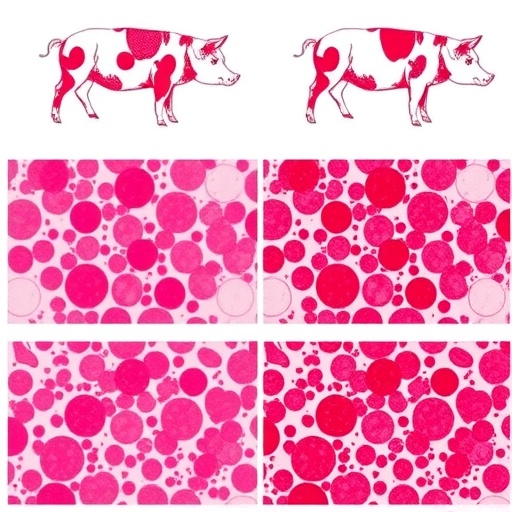In a groundbreaking study published in BMC Genomics, researchers led by Lin Q. and colleagues have gleaned new insights into the intricate relationship between sex and gene expression in pigs, specifically focusing on blood parameters. By meticulously analyzing the genetic influences across different sexes, these researchers have opened a window into understanding how sexual dimorphism manifests at the molecular level. This research holds significant implications for agricultural practices and veterinary sciences, while also broadening our understanding of genetic regulation across species.
The study leverages state-of-the-art genomic technologies, combining both high-throughput sequencing and advanced bioinformatics techniques to investigate gene expression patterns in blood samples of pigs. The choice to focus on blood as a medium for this research is both strategic and insightful, as blood serves as a critical biological fluid that reflects an organism’s physiological condition and genetic makeup. By examining how gene expression varies with sex in this context, the researchers can better understand the underlying biological mechanisms that drive differences in health, growth, and disease resistance in pigs.
As the study reveals, one of the most intriguing findings therein is the identification of sex-specific gene expression profiles. The research team found that certain genes exhibited significantly different levels of expression between male and female pigs. This observation suggests that the biological roles these genes play may be influenced not only by genetic factors but also by the hormonal environments associated with each sex. Therefore, any breeding programs aimed at enhancing desired traits in swine may need to consider these genetic inequalities to optimize outcomes.
An integral aspect of this research was the classification of gene expression through advanced statistical models that could sift through vast datasets to pinpoint genes of interest. Through the use of sophisticated algorithms, the researchers were able to correlate various gene expression levels with physical attributes in pigs, such as weight gain and immune response. This cross-analysis underscores the connection between genotype and phenotype, revealing how differences at the genetic level directly relate to observable traits.
Moreover, the study explores the implications these findings might have for animal husbandry. With a robust understanding of how sex influences gene expression, farmers and geneticists can implement more refined selection strategies. For instance, if certain traits linked to disease resistance or growth rate are more pronounced in one sex over the other, breeding programs can be tailored to enhance these qualities in future generations, improving overall livestock productivity and health.
The advancement in genomic techniques has facilitated a deeper understanding of complex biological systems, and this study serves as a prime example. By employing RNA sequencing, the researchers were able to capture a dynamic snapshot of gene expression, revealing which genes are turned on or off depending on the sex of the pig. This methodology provides a comprehensive look at the transcriptomic landscape in a way that previous techniques could not, allowing for a more extensive analysis of genetic interactions.
As the researchers delve deeper into their findings, they recognize the significance of these results not just for the swine industry but for comparative genomics as a whole. The lessons learned from swine can inform genetic research in other species, including those that are more closely aligned with human biology. Understanding the powerful interplay between sex and gene expression can illuminate pathways for managing health and disease in both livestock and humans.
Furthermore, these findings may push the envelope in terms of genetic research capabilities. The strategic development of sex-specific genetic markers could transform breeding programs, not just in pigs but across various livestock species. By integrating findings related to gene expression into breeding decision-making, livestock industries could achieve unprecedented gains in productivity, health, and sustainability.
Despite the promising nature of this research, it also opens up new questions that need to be addressed. For instance, how do environmental factors interact with genetic predisposition in influencing gene expression? Additionally, what role do epigenetic mechanisms play in the observed differences between male and female pigs? These questions pave the way for future studies that will undoubtedly build on the foundational work presented by Lin et al., helping us unravel the complexities of genetics in livestock.
Understanding the genetic influences of sex on gene expression is not merely an academic pursuit; it holds real-world implications for food security and agricultural sustainability. As the world grapples with the challenges of feeding a growing population with limited resources, optimizing livestock production through genetic insights will be paramount. This research provides a stepping stone towards future innovations in this vital sector.
The publication of this study marks a significant milestone in genomic research and offers a compelling case for continued investment in agricultural biotechnology. By harnessing modern genetic tools, researchers can delve deeper into the biological underpinnings of livestock production, creating a future where scientific advancements serve the dual purpose of enhancing animal welfare and ensuring global food security.
In conclusion, Lin and colleagues have shed light on the genetic complexities surrounding sex and gene expression in pigs, opening new avenues for research and application in animal genetics. This work underscores the importance of integrating genomic data into practical solutions for agriculture and highlights the potential of understanding genetic variation to revolutionize livestock production. As the field moves forward, the insights gained from this study will undoubtedly contribute significantly to the evolution of swine breeding and management practices.
Subject of Research: The genetic influence of sex on gene expression for blood in pigs.
Article Title: The genetic influence of sex on gene expression for blood in pigs.
Article References:
Lin, Q., Huang, J., Zhou, T. et al. The genetic influence of sex on gene expression for blood in pigs.
BMC Genomics 26, 899 (2025). https://doi.org/10.1186/s12864-025-12029-3
Image Credits: AI Generated
DOI: 10.1186/s12864-025-12029-3
Keywords: sex-specific gene expression, pigs, blood, genetics, RNA sequencing, animal husbandry, livestock breeding, genomic techniques, agricultural biotechnology.




